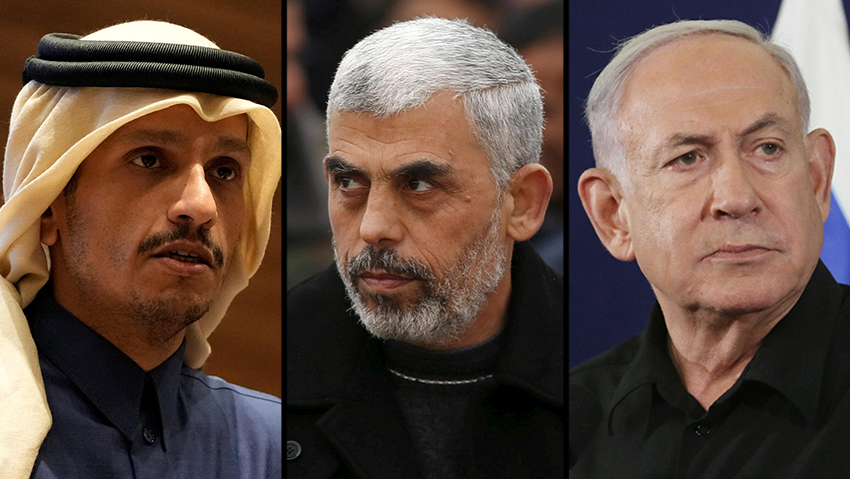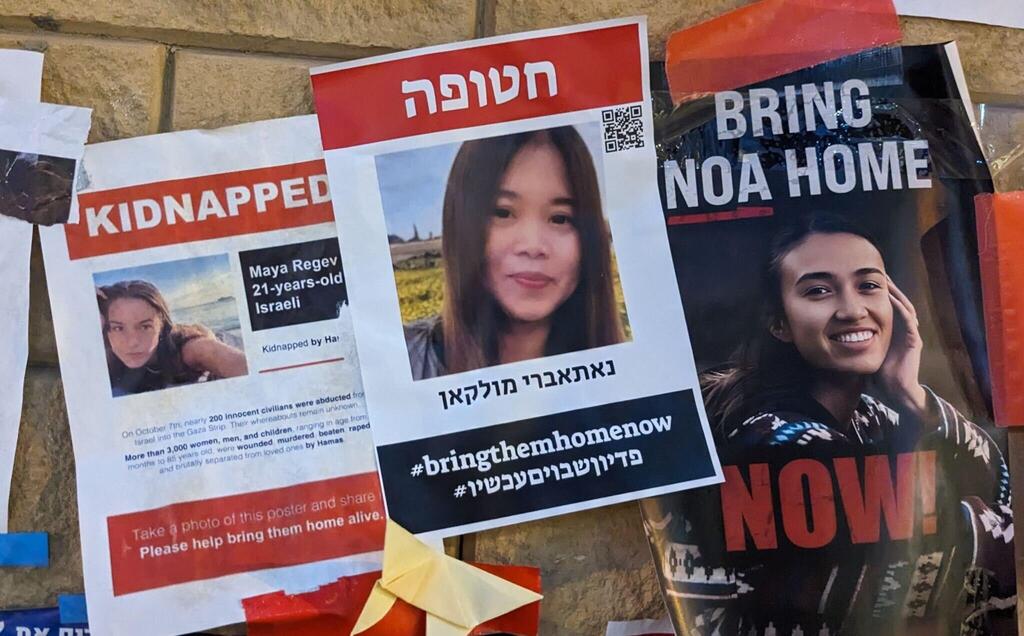Getting your Trinity Audio player ready...
If Hamas does not show flexibility in the upcoming talks in Qatar next week, there will be no deal, a senior Israeli official told Ynet Saturday evening.
2 View gallery


Qatari Prime Minister Mohammed Al Thani, Hamas leader in Gaza Yahya Sinwar and Prime Minister Benjamin Netanyahu
(Photo: Mark Schiefelbein/Pool via REUTERS, Dana Kopel)
Meanwhile, government officials highlighted Hamas' demand for the return of civilians to the northern Gaza Strip, as part of a temporary cease-fire agreement, as a major sticking point, arguing that conceding to this demand would undermine the achievements of the war and effectively return control of the territory’s north to Hamas.
Another hurdle is Hamas' demand for the release of 100 terrorists serving lengthy prison sentences for the murder of Israel whose identities will be determined exclusively by the terror group.
An Israeli source familiar with the matter commented, "Relinquishing control of the northern Strip is more severe than the demand to select the terrorists' names - although that is also very problematic."
Another contentious issue is the second phase of the deal, in which Hamas seeks an agreement to end the war.
More stories:
The War Cabinet is expected to convene Saturday night to decide on the scope of the mandate to be granted to Mossad Director David Barnea in the hostage talks scheduled to take place this week in Qatar, following Hamas' response to Israel’s proposal.
The War Cabinet is scheduled to meet on Sunday evening at approximately 6 pm in a meeting rescheduled from Saturday, after which the expanded Security Cabinet would also meet.
The smaller forum, consisting of Prime Minister Benjamin Netanyahu, Defense Minister Yoav Gallant, and Minister Benny Gantz, is set to determine the extent of authority to be given to Mossad Director David Barnea in the hostage negotiations, in light of Hamas's reply to Israel's proposal.
After the conclusion of Sunday night’s War Cabinet meeting, the matter will be brought before the expanded Security Cabinet, and senior Israeli officials have said that "the boundaries of Israel's stance will be clear."
These discussions are taking place as Prime Minister Netanyahu continues to threaten, possibly as a negotiation tactic to exert pressure on Hamas, with action in Rafah if a deal is not reached.
Following Hamas' response, the Prime Minister's Office said in a statement on Friday that the terror organization "continues to entrench itself in delusional demands."
Hamas' proposed release ratio to mediators suggests that for each female soldier freed from captivity, 50 Palestinian security prisoners will be released, including 30 serving lengthy sentences.
Effectively, the terrorist organization is demanding the freedom of 250 prisoners, with 100 of those sentenced to life in prison, and another 50 also receiving extended sentences.
As part of the agreement, Hamas is demanding the full return of displaced residents to the northern Gaza Strip and the withdrawal of IDF forces from the corridor splitting the northern and southern parts of the territory.
During the six-week ceasefire, negotiations will continue on the second phase of the deal, in which Hamas insists on a permanent cease-fire in exchange for the release of soldiers and youths. Overall, Hamas seeks the release of approximately 800 terrorists.




